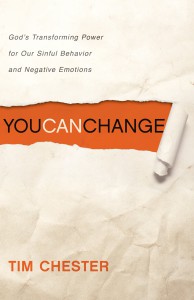Review: You Can Change
 Gill and I have read many books during our life in ministry. Many are helpful, a few are frustrating, and quite a lot are downright disappointing. But some are set apart by being theologically robust and wonderfully relevant and accessible. These are the books that we end up buying multiple copies of and giving away.
Gill and I have read many books during our life in ministry. Many are helpful, a few are frustrating, and quite a lot are downright disappointing. But some are set apart by being theologically robust and wonderfully relevant and accessible. These are the books that we end up buying multiple copies of and giving away.
It’s been a long time since I came across a book that fits into this category. I have found one with Tim Chester’s You Can Change: God’s Transforming Power for Our Sinful Behavior and Negative Emotions. Chester himself describes it as an “anti-self-help book written in the style of a self-help book” which is probably why I like it so much; it subverts all that pop-psych spiritualised self-discovery claptrap that’s out there.
The book was referred to me after I spoke at a Men’s Weekend Away held by our church. By God’s grace among the fruit of that weekend, a number of men are self-motivated to meet together regularly for peer-led discipleship, nurture and accountability. It was they that discovered this book. It is a fantastic resource.
The felt-need addressed by You Can Change is, in the broadest view, the perceived irrelevance of typical church life. In that stereotype the things of church – spirituality, theology, community – are valued and appreciated, but with a frustration that they don’t seem to do anything. The gospel of Jesus can, in some sense, be understood, expressed, and even promoted; and yet at the same time it can feel like nothing ever changes. The struggles, temptations, failings and flaws of our very person remain unaddressed and sometimes unabashed. The gospel moves around us at arms length and our maturation stalls in an eddy of “sinful behaviour and negative emotions.”
The beauty of Chester’s book is that he doesn’t attempt to meet this felt-need by filling the gap between gospel and personal experience with his own ten-step branded model of success-for-the-motivated-Jesus-man; he simply reflects on how to close the gap by applying the gospel as directly as he can to the areas of personal life where change is wanted.
From the “personal experience” side of the gap he encourages his readers to be considering a “change project” as they read; a type of negative behaviour or emotion, or “it might be a Christian virtue, a fruit of the Spirit that you feel is particularly lacking in your life” (p21). Each chapter ends with questions for reflection that allow the specific area of change to be engaged. It’s the sort of thing that is perfect to stimulate discussion in a small accountability group. The structure of the book makes this clear; the chapter titles are:
What would you like to change?
Why would you like to change?
How are you going to change?
When do you struggle?
What truths do you need to turn to?
What desires do you need to turn from?
What stops you from changing?
What strategies will reinforce your faith and repentance?
How can we support one another in changing?
Are you ready for a lifetime of daily change?
These questions are answered from the gospel side of Chester’s approach. Throughout Chester is Christocentric, cruciform, and fully appreciative of the providential sovereignty of God. Consider:
So whom do you want to be like? What would you like to change? Please don’t settle for anything less than being like Jesus and reflecting the glory of God. (p20)
Of significant value is the way in which Chester constantly takes the focus of ourselves and turns us towards God again and again. This is both in what we might call the light sense of re-apprehending the love of God, and it is also in the heavy sense of realising that our sin is also God-centred – a rejection of him, a rebellion, a hardening.
Wrestling with sinful behaviours is something we all share, myself included, and this is a useful corrective. It is so easy to almost romanticise destructive habits as a wrestle, a battle, or a proving ground. In this way we reinforce our attachment to those destructive ways as the self-affirming thing that I must overcome, thus eliminating any reliance on God’s grace, and so once again pushing the gospel away to arms length.
We want to put things right. We want to think of ourselves as a “former user of porn” rather than a “porn addict.”… For us, sin has become first and foremost sin against ourselves. If I sin, then I’ve let myself down. What I feel when I sin is the offense against me and my self-esteem, not the offense against God. (p25)
In this way Chester has one of the best grasps on a biblical harmatology that I have encountered. As we duck and weave, it simply pokes and prods and reminds us that its not about us. We are not the solution, we must turn to Christ because “external activities can’t change us… because sin comes from within, from our hearts” (p42). We need our hearts to be changed, and that has ever been God’s work. Indeed, “we become Christians by faith… we stay Christians by faith… we grow as Christians by faith,” (p43) “God wants us to walk in obedience, not [our own] victory” (p118).
We’re changed when we look at Jesus, delight in Jesus, commune with Jesus. But no one can embrace Jesus if still guilty of sin. And no one will embrace Jesus if still feeling the guilt of sin. So change begins only when we come under grace with its message of divine pardon and welcome. (p50)
We are changed by God’s grace, we are saved and sanctified by God’s grace. By God’s sovereign grace the Holy Spirit simply is at work in us, to change us. Our sin as Christians is not therefore a failure to turn to Christ, its a choice to pull away from him. This is Chester’s central comfort and his main provocation:
I used to think sanctification was a bit like pushing a boulder up a hill. It was hard, slow work, and if you lost concentration you might find yourself back at the bottom. But it’s more like a boulder rolling down a hill. There’s something inevitable about it, because it’s God’s work, and God always succeeds. The sad thing is that often I try to push the boulder back up the hill. I say in effect, “Don’t change me yet, I like doing that sin.” (p55)
If we truly want the grace of holiness, we must get lower, humbling ourselves and leaving the lifting up to God. (p118)
Around this central focus Chester addresses the felt-need questions. There is very little that is novel in his approach. Occasionally he seems to be close to some of the twelve steps. At other times what he proposes is basically a form of Cognitive Behavioural Therapy. But it is all useful, and, above all, applicable.
There are two dangers that Chester avoids really well. The first is the risk of wrong passivity – ‘if God has done it and is doing it then I don’t have to do anything at all.’ The second is the risk of wrong activity – ‘if I can only fulfil this or achieve that then I will be OK.’ He doesn’t avoid this by silence. There are practical suggestions, and proposed exercises, elements of choice that engage with the nominated change project. In summary they are:
1. Keep returning to the cross to see your sin canceled and to draw near to God in full assurance of welcome.
2. Keep looking to God instead of to sin for satisfaction, focusing on the four liberating truths of God’s greatness, glory, goodness and grace.
3. Cut off, throw off, put off, kill off everything that might strengthen or provoke sinful desires.
4. Bring sin into the light through regular accountability to another Christian
(p173)
It’s the fourth point that has been the context in which I have read this book: the community of a men’s weekend and the groups that are subsequently developing. My hope and prayer is that for the men who read this book, myself included, that grace-filled community, which is so utterly absent in our pious illiberal secularist world, will be the place where Christ is met anew, and reflected in our individual and communal life.

 The conclusion
The conclusion

